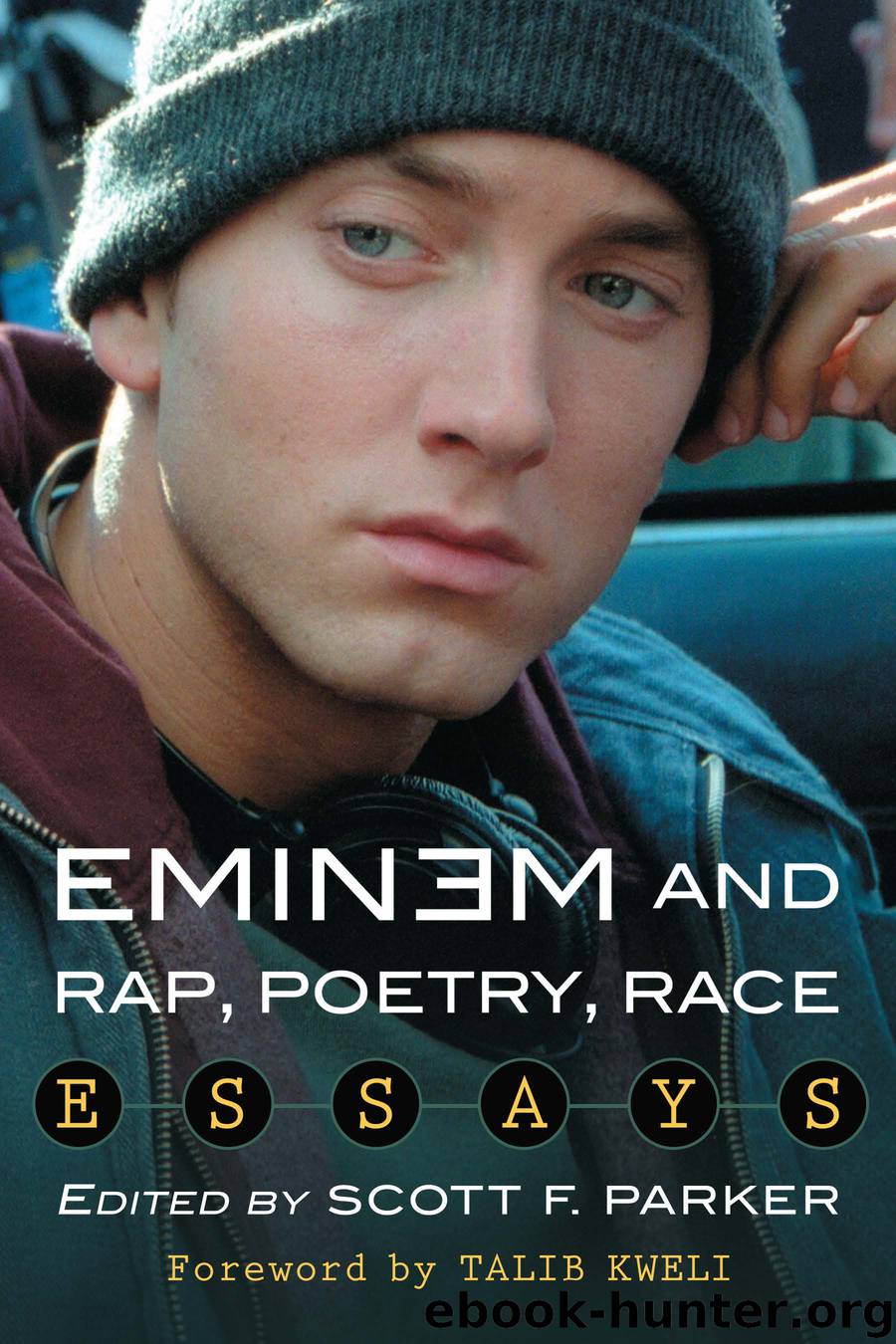Eminem and Rap, Poetry, Race by Parker Scott F

Author:Parker, Scott F.
Language: eng
Format: epub
Publisher: McFarland & Company, Inc., Publishers
Published: 2014-11-11T16:00:00+00:00
Eminem’s Phrasal Approach to Rap Song Structure
The effect of Eminem’s sense of phrasing on a song’s larger form is groundbreaking as well. Eminem’s original approach to the traditional rap song structure is supported by the placement of his rap’s phrasings. Once again, Eminem displays an unfailing awareness of the musical tools available to him. This can be seen on the 2004 song “Never Enough,” on which 50 Cent and Nate Dogg also appear. On this very short song, Eminem and the producers, Dr. Dre and Mike Elizondo, have structured it so as to place the MCs’ rapping skills in the very forefront. The song is short, clocking in at only 2:39, and starts immediately with the rapping verse, without any instrumental intro. Additionally, there are just two choruses, also called hooks, that last only eight bars each, and there is not a single bar during this song that does not have rapping in it. Eminem doubles down on this artistic gamble when he makes his own verse last a full thirty-two bars, which is an unmistakably symbolic number to insiders of the rap community.
This is because sixteen bars is the standard length of a rap verse. In fact, as Paul Edwards notes in How to Rap, professional rappers even sometimes refer to a verse as simply “a 16.”22 Any shorter and an MC might display a lack of confidence in their skills; any longer and the rapper quickly risks overstaying their welcome if he or she isn’t talented. By extending the phrases in his own verse to twice the normal length and minimizing the comparatively simple sections of a rap song, Eminem musically backs up his verbal message on “Never Enough” that he truly is the one of the greatest rappers of all time.
Eminem’s awareness of musical structure is further borne out on the 1999 song “Forgot About Dre.” This song’s particular hook lasts four bars, and first comes after a Dr. Dre rap verse made up of sixteen bars. Although sixteen bars is the standard length of a verse, one can also find verses consisting of just eight bars or less, as on Talib Kweli’s 2002 song “Guerrilla Monsoon Rap,” OutKast’s 2000 song “Gangsta Shit,” or The Wu-Tang Clan’s 1993 song “Shame on a Nigga.”
After the end of the hook’s first appearance on “Forgot About Dre,” Eminem starts his own verse, at 1:25. But after the first eight bars of Eminem’s verse, Dr. Dre inserts a completely new musical idea at 1:54, a distorted guitar riff, in the same place that a hook could typically appear. We also know that this guitar idea is a stand-in for the hook because they both last the same exact amount of musical time on this track: four bars. As Edwards notes, “Choruses can theoretically be of any length, but they are usually four or eight bars long.23
During this new kind of hook, Eminem doesn’t return to the same rap that he originally delivered in the true hook, as would happen in most other rap songs.
Download
This site does not store any files on its server. We only index and link to content provided by other sites. Please contact the content providers to delete copyright contents if any and email us, we'll remove relevant links or contents immediately.
| Anthropology | Archaeology |
| Philosophy | Politics & Government |
| Social Sciences | Sociology |
| Women's Studies |
Nudge - Improving Decisions about Health, Wealth, and Happiness by Thaler Sunstein(7711)
The Fire Next Time by James Baldwin(5451)
iGen by Jean M. Twenge(5418)
Adulting by Kelly Williams Brown(4579)
The Sports Rules Book by Human Kinetics(4393)
The Hacking of the American Mind by Robert H. Lustig(4386)
The Ethical Slut by Janet W. Hardy(4260)
Captivate by Vanessa Van Edwards(3842)
Mummy Knew by Lisa James(3694)
In a Sunburned Country by Bill Bryson(3544)
The Worm at the Core by Sheldon Solomon(3488)
Ants Among Elephants by Sujatha Gidla(3468)
The 48 laws of power by Robert Greene & Joost Elffers(3293)
Suicide: A Study in Sociology by Emile Durkheim(3024)
The Slow Fix: Solve Problems, Work Smarter, and Live Better In a World Addicted to Speed by Carl Honore(3012)
The Tipping Point by Malcolm Gladwell(2927)
Humans of New York by Brandon Stanton(2873)
Get What's Yours for Medicare: Maximize Your Coverage, Minimize Your Costs by Philip Moeller(2751)
Handbook of Forensic Sociology and Psychology by Stephen J. Morewitz & Mark L. Goldstein(2705)
